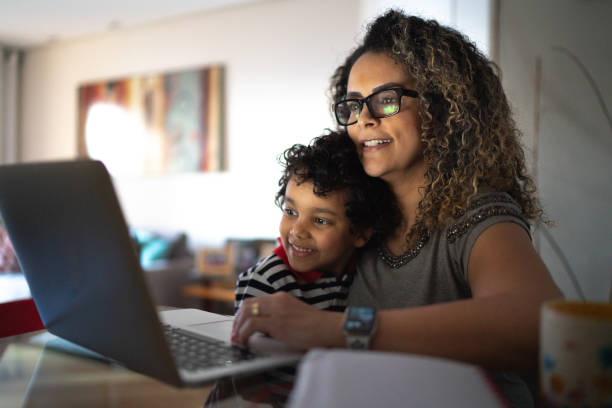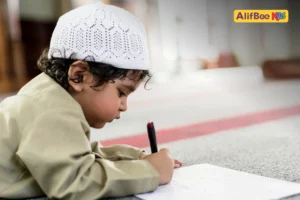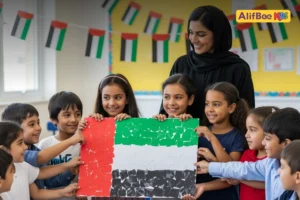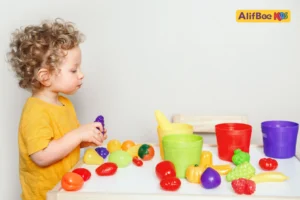When Should Your Child Start Learning Arabic?
Parents usually wonder when to start teaching their kids Arabic.
Some are excited to start their kids’ Arabic learning journey when they learn to say their first words.
Others delay introducing a new language until the child joins school and starts learning it during their school years.
Research says it’s best to start teaching your kids a new language before they are eight.
In those early years, children possess many advantages that make learning a new language easier and more successful than later in their lives.
What makes learning Arabic easy for young children?
Language learning is usually challenging for adults, while children often learn languages more easily. Learning the Arabic language is no different. Children possess advantages that make the Arabic language, in particular, more accessible to them than it is for adults.
- More Adaptable Brains: Parents should take advantage of their younger brains’ sharper skills. Children possess flexible brains, which make it easier for them to absorb new languages.
- Fast Learners by Nature: Unlike adults, children are natural language learners. They learn languages instinctively by listening and mimicking without focusing on grammar rules.
- No Pre-established Knowledge: Young children don’t have established language patterns, so learning a new language doesn’t conflict with existing knowledge.
- Immersive Learning: Children often learn languages through daily interactions and play, making the process seamless.
Why you should start teaching your child Arabic early?
If you are still unsure whether or not it is crucial to start teaching your child Arabic at an early age, you should consider the following reasons.
- Easier Pronunciation and Accent Development
Children who start young are more likely to develop a native-like accent.
Arabic has sounds that don’t exist in many other languages. Letters like ر Raa’ and ض Dhad require early practice to get accurate.
Therefore, early exposure can make a big difference in your child’s pronunciation. It also helps them pick up a more natural accent.
- Stronger Vocabulary Retention
The earlier kids start learning Arabic, the more vocabulary they can build over time. Their brains are wired to store and recall new words more easily.
So, if you start using Arabic in front of them and with them about everyday topics, they can slowly start building their vocabulary and use it more readily and easily as they grow up.
- Lifelong Appreciation for the Language
Starting young fosters a natural love for Arabic. Kids who grow up speaking the language are more likely to continue using it in adulthood.
What’s the Best Age for Learning Arabic?
Starting as Early as Toddler Years (0-3 Years)
For parents who can introduce Arabic during their child’s toddler years, go for it! Kids are naturally curious at this age and will absorb the language effortlessly through repetition and exposure.
Preschool and Kindergarten (3-6 Years)
This is a sweet spot for language learning. Preschoolers have longer attention spans and can start understanding basic sentence structures, making it easier to teach them Arabic songs, rhymes, and stories.
Primary School Age (6-12 Years)
If your child is in primary school, it’s still a great time to start. They’ll have the ability to grasp Arabic grammar and vocabulary faster, and you can incorporate reading and writing skills into their lessons.
Teenagers (12+ Years) – Is It Too Late?
It’s never too late to start! While teenagers might find it harder to master pronunciation, they can quickly pick up vocabulary and conversational skills with the right motivation.
How to Get Started with Arabic for Kids
Start with Basic Words and Phrases
Think of everyday phrases like “مرحبا,” (hello) “شكرًا,”(thank you) or “صباح الخير” (Good morning). These small wins build confidence and excitement.
Use Fun and Engaging Tools
Kids learn best through play. Try Arabic songs, storybooks, and educational apps designed for children, like the AlifBee Kids app.
Immerse Them in Arabic Culture and Media
Expose your child to Arabic cartoons, movies, and music. It’s a great way to make the language come alive.
Should You Hire a Tutor or Use Online Resources?
Benefits of One-on-One Tutoring
A private tutor can provide personalized lessons and focus on your child’s unique learning pace.
Best Online Platforms and Apps
Apps like AlifBee Kids, Duolingo, or Rosetta Stone have interactive lessons perfect for kids. Explore platforms specifically designed for Arabic learners.
Creating a Learning Schedule at Home
Set aside 10-20 minutes a day for Arabic practice at home. Consistency is key, even if the sessions are short.
Teach Your Kids Arabic with AlifBee Kids
AlifBee Kids is a great option to teach your kids Arabic at their own pace, regardless of the age you decide to start.
This Arabic Learning app is designed to teach children aged 2 to 8 the Arabic language through engaging and interactive methods.
The app employs the Entertainment Immersion Method, which leverages children’s natural affinity for play and repetition to facilitate language acquisition.
Key Features of AlifBee Kids
Interactive Learning Modules: The app offers a variety of games, stories, and songs that introduce Arabic letters, words, and phrases in an enjoyable manner.
Arabian Sinbad Series: Featuring the character Sinbad and his 23 friends, this series provides animated stories and activities that immerse children in the Arabic language. The content is delivered by native speakers, ensuring accurate pronunciation and cultural context.
Comprehensive Curriculum: AlifBee Kids covers various subjects, including Arabic letters, math, cognitive skills, life skills, geography, science, and Islamic studies, aligning with the kindergarten curriculum.
Safe and Ad-Free Environment: The app provides a secure learning space without advertisements, allowing children to focus solely on their educational activities.
Customizable Learning Experience: Parents can tailor the educational content to their child’s interests by enabling or disabling specific topics, ensuring a personalized learning journey.
Teaching Methodology in AlifBee Kids
AlifBee Kids uses the Entertainment Immersion Method, engaging children through interactive content that promotes natural language acquisition.
The app includes over 150 activities, such as games, songs, and cartoons, to reinforce learning.
Children are exposed to more than 1,000 essential Arabic words and phrases, selected for their relevance to daily life.
Moreover, the app’s content is crafted by native Arabic speakers, providing clear instruction and engaging lessons that help children develop proficiency in reading, speaking, and writing Arabic.
Parental Involvement
AlifBee Kids includes features that allow parents to monitor their child’s progress and adjust the learning material as needed.
This involvement ensures that the educational experience aligns with the child’s developmental stage and interests.
Final word
So, when should your child start learning Arabic?
The earlier, the better—but don’t stress if you’re starting later. With the right tools, motivation, and support, kids of all ages can master this beautiful and rewarding language.
Remember, it’s not just about learning words; it’s about opening doors to a new world of culture and opportunities.





